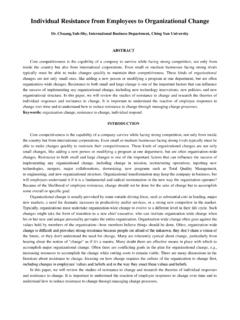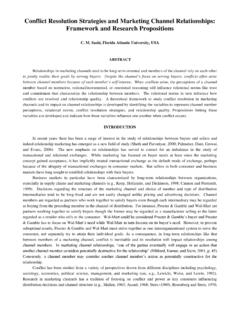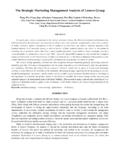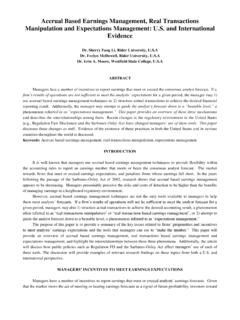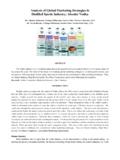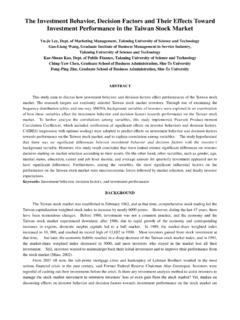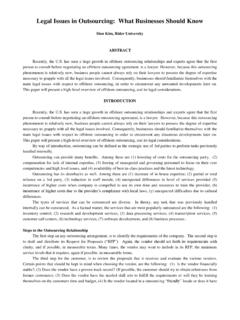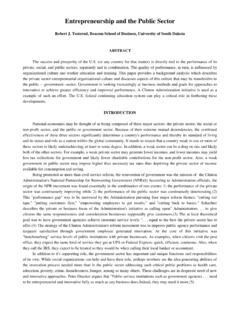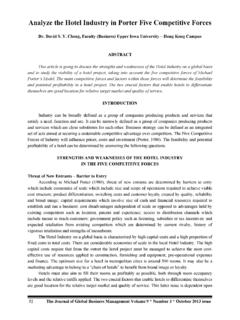Transcription of Factors that affect consumer trust in online shopping in ...
1 Factors that affect consumer trust in online shopping in Taiwan Mei- jane Chan, DBA candidate, Northwestern Polytechnic University, USA. Dr. Yann-Haur Huang, Professor, Northwestern Polytechnic University, USA. ABSTRACT. The purpose of this paper was to examine the critical Factors that affect consumer trust in online shopping environment in Taiwan. Based on the implications derived from the previous literature review, the Factors affecting online trust are presented, which provide a basis for the further development model of trust in this study. The study suggests that if there are more perceived trust in online shopping environment and if shoppers felt that online shopping gave them enough comfortable and security about the service and products , the number of online shoppers would be higher.
2 Thus, the objective of this research is to test which Factors have an effect on consumers' trust and on their subsequent intention to purchase online . The purpose of this study is hopefully to help website managers to enhance their website trustworthiness. This model consists of the website quality, the structure assurance, the web vendor reputation and capability, and product information. INTRODUCTION. Despite the rapid growth of the Internet and the high market potential of business-to- consumer (B2C) electronic commerce, actual online revenues still remain quite modest when compared to the offline world.
3 According to the Pew Internet Project s September 2007 survey, 78% of online Americans agree that shopping online is a way to save time and a convenient way to buy products. But, at the same time, three-quarters (75%) of internet users express discomfort over a key step in online shopping sending personal or credit card information over the internet. Lack of trust has been one of the most frequently cited reasons for consumers not purchasing from Internet vendors (Lee and Turban, 2001, p. 75). McKnight, Choudhury and Kacmar (2002, p. 298) also stated that the lack of consumer trust , both in the specific web-based vendors and in the overall e- environment, has been a hindrance to electronic commerce.
4 So, a number of studies have investigated the role of trust in the e-commerce environment with all kinds of different research foci, analyzing the trust towards several aspects and hoped to explore what Factors affected the consumers intention to trust .(Grabner-Kr uter and Kaluscha, 2003; Shankar, Urban and Sultan, 2002). This study based on the model proposed by Cheung and Lee (2000) and other previous literature to examine the consumer s trust in online shopping in Taiwan and hopes to explore the Factors which affect their trust in online shopping and give the e-vendors suggestions in their business strategies.
5 Cheung and Lee s (2000) model suggests that a customer's trust in Internet shopping is positively related to the trustworthiness of Internet vendors and the external environment. The model proposed that trustworthiness of Internet vendors (including perceived security control, privacy control, integrity and competence) and external environment (third part recognition and legal framework) are positively related to the customer's trust in Internet shopping . LITERATURE REVIEW. trust antecedents identified in the literature trust has been positively recognized to influence online consumers' purchase intentions (Jarvenpaa et al.)
6 , 2000;. Lim et al. , 2001; McKnight et al. , 2002; ). Consequently, understanding the Factors that influence the trusting beliefs in an online environment is of considerable necessary and important to researchers ( Lee and Turban, 2001;. Koufaris and Hampton-Sosa, 2002; McKnight et al. , 2002; Chen and Dhillon, 2003; Corritore et al. , 2003; Gefen and Straub, 2003). There are a number of literature provides considerable evidence that a number of Factors have strong predictive importance. These Factors include the characteristics of the online vendor, situational Factors , third-party certification and recommendation.
7 The detailed references are listed in Table 1and below. Table 1: Factors Affecting trust in online shopping REPUT Reputation Kim,M. and Ahn, J(2007); Doney and Cannon,( 1997); Kim, Xu, and Koh(2004) ; Pavlou (2002). size Jarvenpaa et al. (1999, 2000). the vendors perceived Chen and Dhillon, 2003; Chen and Dhillon (2003); McKnight et al. integrity (2002); Cheung and Lee (2000). the vendors perceived McKnight et al., 2002; Chen and Dhillon (2003); McKnight et al. competence (2002); Cheung and Lee (2000). SECURITY perceived security controls Gauzente, 2004; Cheung and Lee (2000); Kim, Xu, and Koh(2004).
8 Perceived privacy controls Belanger et al., 2002; Cheung and Lee (2000); Kim, Xu, and Koh(2004). situational Factors Bigley and Pearce, 1998; Hagen and Choe, 1998; Lewicki and Bunker, 1995; Sitkin, 1995; Ring & Van De Ven; 1992. THIRD third party certification McKnight and Chervany, 2001; Hoffmann et al., 1999; Jarvenpaa and Grazioli, 1999; Kovar et al., 2000a; 2000b; Cheskin Research, 2000;. Cheung and Lee (2000). legal framework Bigley and Pearce, 1998; Fukuyama, 1995; Cheung and Lee (2000). RECOM Recommendation and Kim and Prabhakar (2002); Jarvenpaa et al.
9 2000 ; Grabner-Kr uter, testimonials S. (2002). PRODUCT Product information Lee and Turban (2001) ; Grabner-Kr uter, S. (2002). FULFILL Order fulfillment Iakov Y. Bart Venkatesh Shankar Fareena Sultan Glen L. Urba(2005). WEB Web site design Kim, Xu, and Koh(2004); Koufaris and Hampton-Sosa(2004). Lee and Turban (2001). SERVICE Service quality Kim, Xu, and Koh(2004). Trusting beliefs Chen and Dhillon, 2003; Bhattacharjee, 2002; Lee and Turban, 2001;. McKnight et al., 2002; Peters et al., 1997; Mayer et al., 1995;. Covello, 1992; Barber, 1983; Cheung and Lee (2000).
10 Characteristics of the online vendor Previous studies consider trust to be a perception of trustworthiness from a number of e-vendors characteristics (Covello, 1992; Lee and Turban, 2001). Chen and Dhillon's (2003) concluded from the trust literature and identified competence, integrity and benevolence as key dimensions of trust in an Internet vendor.. Situational Factors Institutional Factors are suggested to be able to encourage risk taking and consequent trusting behavior by some studies (Lewicki and Bunker, 1995; Sitkin, 1995; Bigley and Pearce, 1998; Hagen and Choe, 1998 ).
